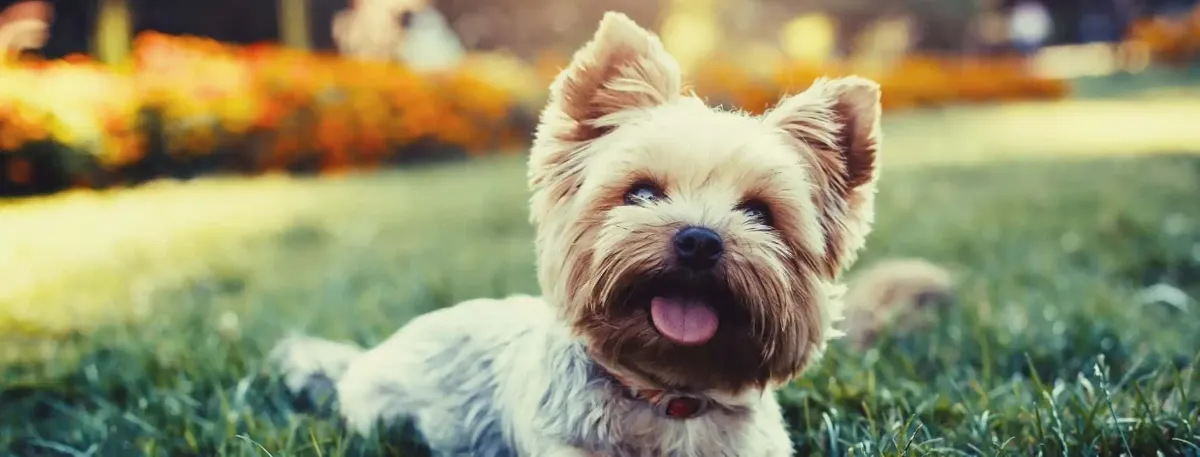
Big dogs in small bodies. This is what is said of Yorkshire Terriers. These dogs are tiny and cute, yet brave and combative. With their interior features and elegant looks, they are one of the most popular breeds. This article will write about the history of this breed, its characteristics, nutritional and grooming needs, and other important information. If you’re wondering if these dogs are right for you, read on.
Let’s start!
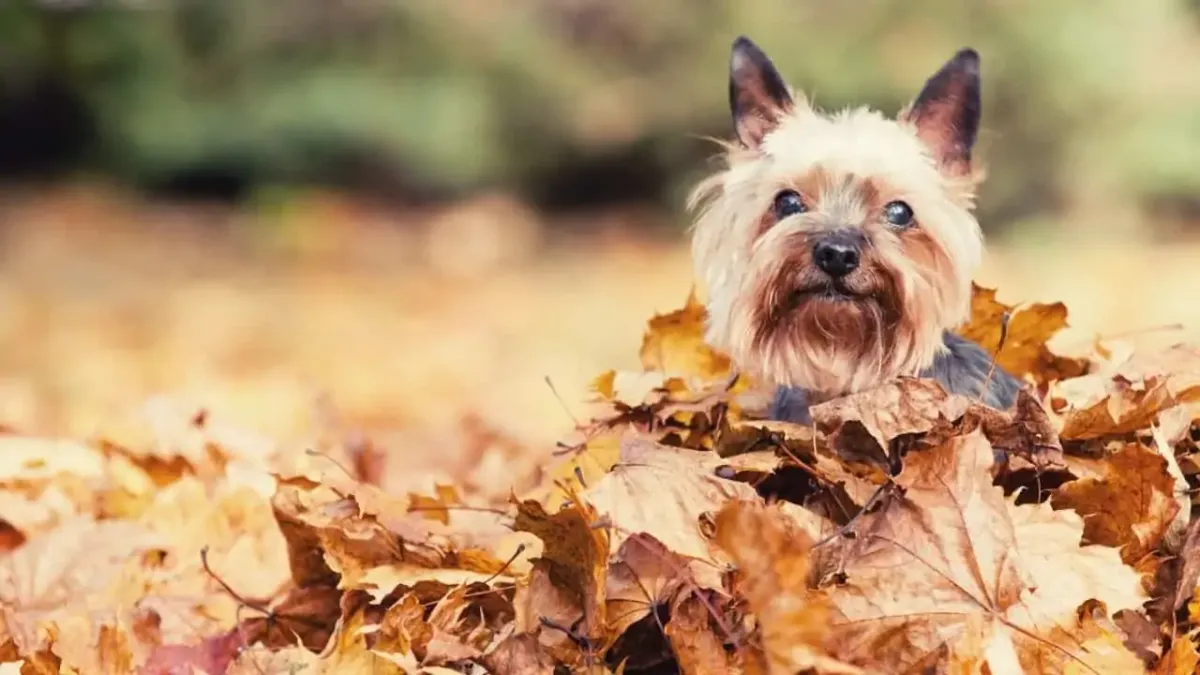
Basic stats:
- Height: 7-8 inches
- Breed Group: Companion Dogs, Toy Group
- Weight: 5-7 pounds
- Life span: 11-15 years
About Yorkshire Terriers in brief
Yorkshire Terriers (also known as Yorkies), despite their small size, have a huge personality. They are brave and, in fact, usually, forget about their small size and are always ready for another challenge, even against larger dogs. In addition, they can draw attention to themselves with their style and long-haired hair.
The Yorkshire Terriers are social creatures. They love their owners and family members, available at any time for a little play or cuddling. However, they don’t like strangers. They want to bark at everything and everyone who doesn’t belong in the family. They can sometimes be aggressive towards alien dogs and cats. That’s why it’s important to teach your Yorkie the right behavior, so he doesn’t drive your neighbors crazy.
Despite the above, Yorkies can be very gentle and sentimental. They require a lot of care and time spent with their loved ones. For this reason, they should not be left alone for long hours. Your Yorkie can replicate your mood, so you need to pay attention to how you feel about what’s happening in the world. If you’re nervous, he’ll be anxious too.
Basically, Yorkshire Terriers get along well with kids. However, don’t forget to teach your kids that these little puppies should be respected as well.
These dogs have a great time in the apartments. If they get enough play and exercise, they will be able to drain their excess energy. Training can be almost anything: playing in the living room or on the playground or taking a long walk.
Yorkies get along very well with other pets. But only if they were raised with them. Unfortunately, this is not the case with new animals. They can become aggressive and envy their owners. When it comes to fighting, Terriers can go all the way to the end. If you bring a new pet home, you need to be very careful.
Reading the above, it is perhaps no wonder that the Yorkshire Terrier is the second most popular dog breed in the United States. Their small size is associated with a huge personality and loyalty.
History of Yorkshire Terriers
The Yorkshire Terriers are from Yorkshire, Scotland. Scottish workers went to work here in the factories during the English Industrial Revolution. They also brought dogs with them, whose job was to capture rats in factories and mills. These dogs were also Terriers, though larger than the Yorkies today. They were known as Clydesdale Terriers or Paisley Terriers.
Clydesdale Terriers have probably been crossed with other terriers, but it is not possible to know exactly which ones. It is possible that the English Black, Tan Toy Terrier, the Skye Terrier, and the Waterside Terrier were these breeds. The latter was a dog with a long blue-gray coat. This would explain one of the colors of the Yorkies’ coat.
A dog named “broken-haired Scotch Terrier” was shown in a bench show in 1861. This puppy was called Huddersfield Ben, and he was the predecessor of the Yorkies living today. In 1870, the breed was given the name Yorkshire Terrier because, as I mentioned, it developed there. The Yorkies were registered in 1874 by the British Kennel Club. In 1898, the first Yorkshire Terrier breed club was founded.
According to records, the first American Yorkie was born in 1872. In 1878 this breed had already competed in dog shows.
Some Interesting Facts About Yorkies
- The first therapy dog was a Yorkshire Terrier
- They were one of the first registered breeds
- This is one of the most popular breeds in America
- Richard Nixon had a Yorkie in the White House
- Their coat has a similar texture to human hair
Personality
Yorkies are wonderful creatures. They can have many different personalities; some of them love to cuddle and can do anything to be close to their owner. Others do just the opposite. But basically, every Yorkie loves its owner.
Training and setting limits should begin as soon as possible. Yorkies can be very intelligent and obedient, but adults are harder to teach. It is difficult to correct bad habits and behaviors later.
Also, start your early socialization with your Yorkie puppy. Expose him to a wide variety of stimuli, people, animals, and experiences. Following the above tips will help you have a well-behaved well-rounded puppy.
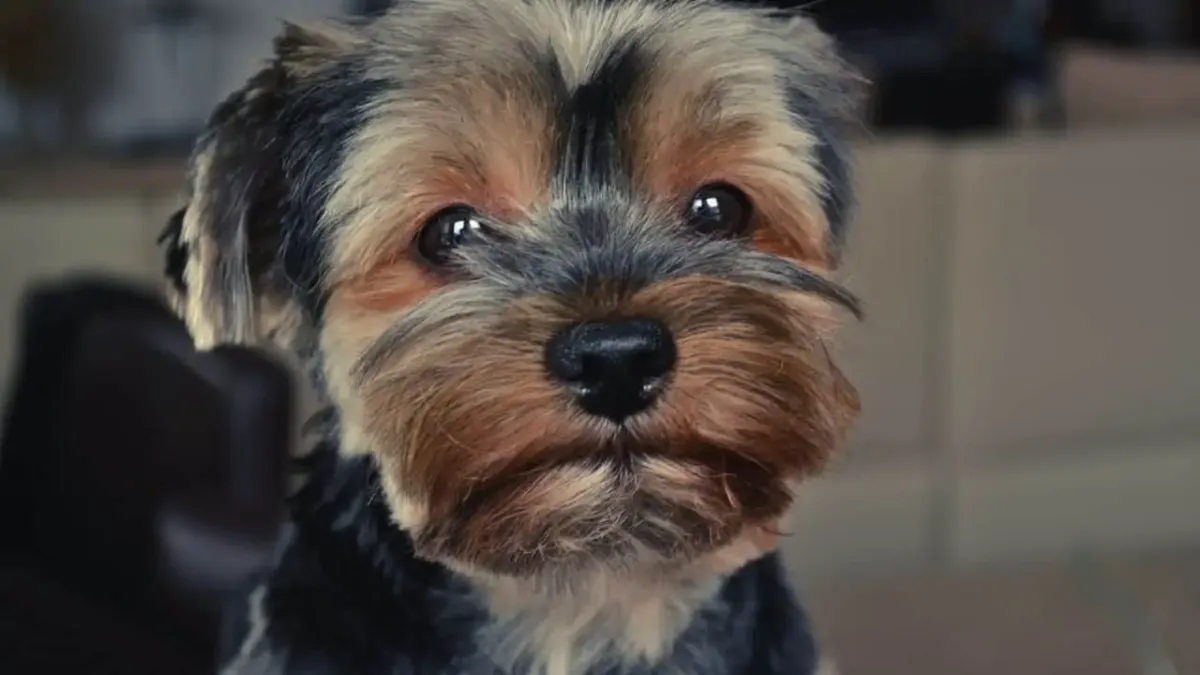
Health care
Yorkies are healthy dogs in general. However, there are some diseases to which they are prone. I want to detail these below.
- Patellar Luxation: This is a common condition in small dogs. The patella has three parts: the thigh bone, knee cap, and tibia. In Patellar Luxation, these three are not properly lined up, causing lameness or abnormal gait. The condition is also present when the dog is born, but luxation usually only occurs later. Rubbing of the joints can lead to arthritis. Patellar Luxation has several grades and can be surgically treated.
- Progressive Retinal Atrophy: It is a degenerative disease in which the photoreceptors in the eye are lost. The process is slow. The condition can be detected years before blindness occurs. Dogs from trusted breeders are usually examined annually by veterinary ophthalmologists.
- Portosystemic Shunt: Blood flows abnormally between the liver and the body. For this reason, detoxification and the various metabolic processes do not take place properly either. The disease’s symptoms may include loss of appetite, low blood sugar, gastrointestinal issues, urinary tract problems, stunted growth, etc. In most cases, these signs can be detected before the age of two. The disease can be treated with a special diet and corrective surgery.
- Hypoglycemia: Hypoglycemia is common in Yorkies, especially under stress. The condition is caused by low blood sugar. Symptoms include confusion and weakness. If you notice any signs, be sure to talk to your veterinarian. He will know the prevention and treatment options.
- Collapsed trachea: Tracheal collapse is common in small dog breeds. A sign of this may be a chronic rough, dry cough. The disease can be treated medically or surgically.
- Reverse sneezing: This condition is similar to the Collapsed trachea but less severe and does not last long. Triggers of reverse sneezing can be agitation, eating too fast or drinking, and various air irritants. The nasal secretions of the dogs are placed on their palate, and this causes the reaction. It may have a scary voice, but for the most part, it’s a harmless thing. If your puppy calms down, the reverse sneezing will go away as well.
- Other conditions: Various infections, dental and gum problems.
Feeding and nutrition
I recommend good quality food for all breeds, and the Yorkshire Terriers are no exception. There are dog foods made specifically for Yorkies, which in many cases have been developed with the help of veterinarians. Be sure to look for these.
The recommended daily amount is about 1/2-3/4 cups of dry food. Of course, the exact amount depends on many factors. It depends on your dog’s age, sex, and level of activity. But this is no wonder because the same is true for people. You also need a different calorie intake if you are actively exercising than lying on the couch all day. The quality of the dog food you buy should also be considered. Premium quality foods tend to have a higher caloric density, so dogs need less amount of them.
While this breed doesn’t eat too much, make sure your Yorkie doesn’t gain weight. On the one hand, excess fat in such a puppy is not very aesthetic. On the other hand, obesity can have several adverse health consequences. Divide the daily caloric intake into two meals. Don’t leave food out for your dog all day.
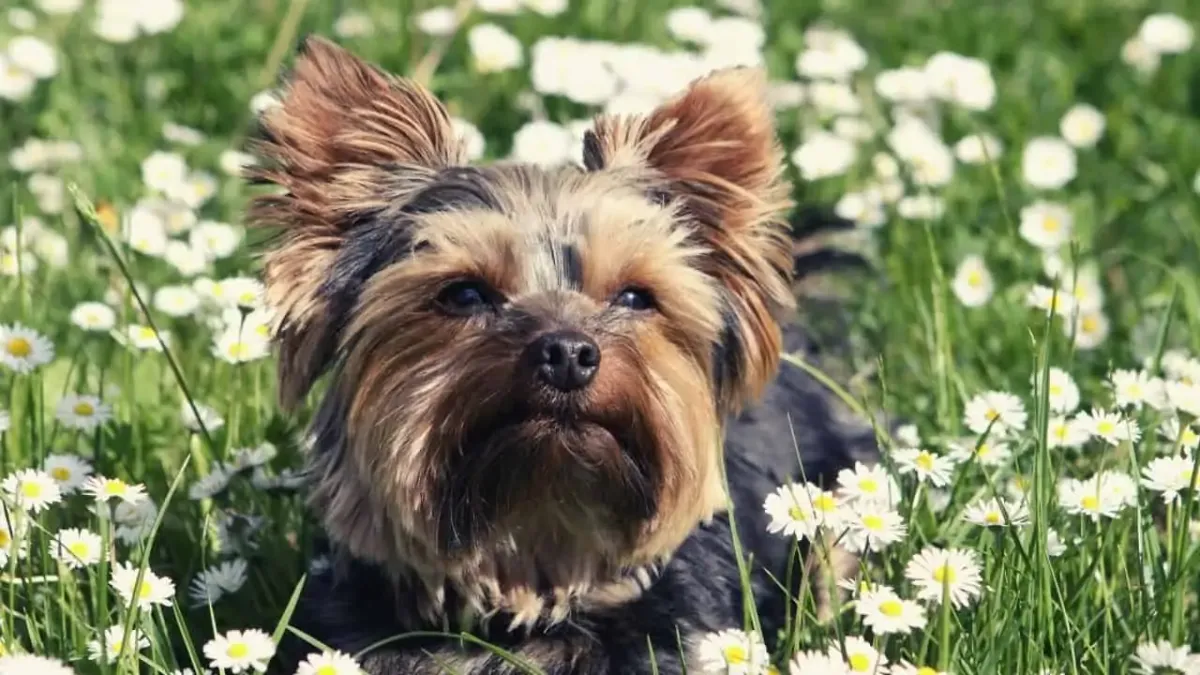
Coat and grooming
The coat of the Yorkies is known to everyone. It is silky, straight, and not wavy. The fur of the most beautiful show dogs usually reaches the ground, and they have a single coat. They shed very little hair. Puppy Yorkies are black at birth. The other colors (blue and brown) do not develop until later, after one.
The steel blue color can be detected from the back of the head to the tail. The color of the head is gold and tan. The hair on the face is long and golden in color. The hair at the muzzle and the base of the ears are darker. The legs are also tan, but only up to the elbows. Age and hormonal changes can affect the color of the Yorkies. The color of older dogs may be lighter. The same is true for females in heat.
The coat of Yorkshire Terriers is not the easiest thing to take care of in the world. It becomes easily tangled, and mats can form in it even if you keep it trimmed short. Daily brushing is highly recommended. This prevents tangles and mats from forming and keeps your dog’s coat clean.
The same goes for dental care. Yorkies are susceptible to dental problems. Regular brushing prevents the formation of tartar. Also, you may want to schedule a professional cleaning by your veterinarian once a year.
Checking the ears should also be part of the grooming. If they smell bad, have redness, or have secretions in them, contact your veterinarian.
To care for the coat, not only brushing is important, but also regular bathing. Bathe your Yorkie once a week. This will make the coat beautiful, clean, and shiny. Do not rub while bathing. After moisturizing and applying the Yorkie shampoo, slide your fingers along the coat to remove any dirt. You can also use a conditioner. Pay attention to the thorough rinsing. You can also use a conditioner while drying and brushing.
Nail trimming is also important. It is usually worth doing this once a month. If possible, do it after bathing because then the nails will soften. Be careful because Yorkie nails are tiny and have blood vessels in them. If you want to be sure, visit a professional groomer. A nail grinder can also make your job easier; based on experience, these tools are less intimidating for dogs.
Grooming may be a natural thing for you, but dogs don’t usually feel that way. Therefore, you must start getting your puppy Yorkie accustomed to these processes as soon as possible. Hold his paw in your hand often and look into his mouth and ears. Don’t forget praise and reward. With these steps, you can make grooming a positive experience for both of you. This will make subsequent veterinary examinations easier.
Examine other parts of your dog’s body while grooming. Look for signs of wounds, injuries, infections, redness, etc. If you do this weekly, you can easily spot any problems.
Exercise
Yorkies don’t need too much exercise. However, some regular walks, short play sessions are specifically needed for them. For example, they love to chase a tennis ball in the backyard. A half-hour walks a day is enough to make them feel good physically and mentally.
You can even try different dog sports like obedience or agility. This provides not only a physical but also a mental stimulus to your dog.
Training
The Yorkshire Terriers are very fond of their owners, intelligent, and obedient. With a little positive reinforcement, praise, and treats, almost anything can be achieved with them. It’s best to get your Yorkie used to different situations, people, and animals from the beginning. If these experiences are positive, you will have a much calmer dog.
Yorkies excel in canine activities such as rally, agility, and obedience. In many places, this breed is used as a therapy dog.
Behavior With Children And Other Pets
Yorkies are tiny dogs. For this reason, they are not suitable for families with children under 5-6 years. This is because these children can easily injure them accidentally. Of course, with proper care, you can teach them how to behave with such small animals.
If you start early socialization, these puppies will quickly make friends with other pets, even cats. But don’t be hopeful if it’s a foreign big-bodied dog. Your Yorkie will definitely want to rival, even if the other dog is ten times bigger than him.
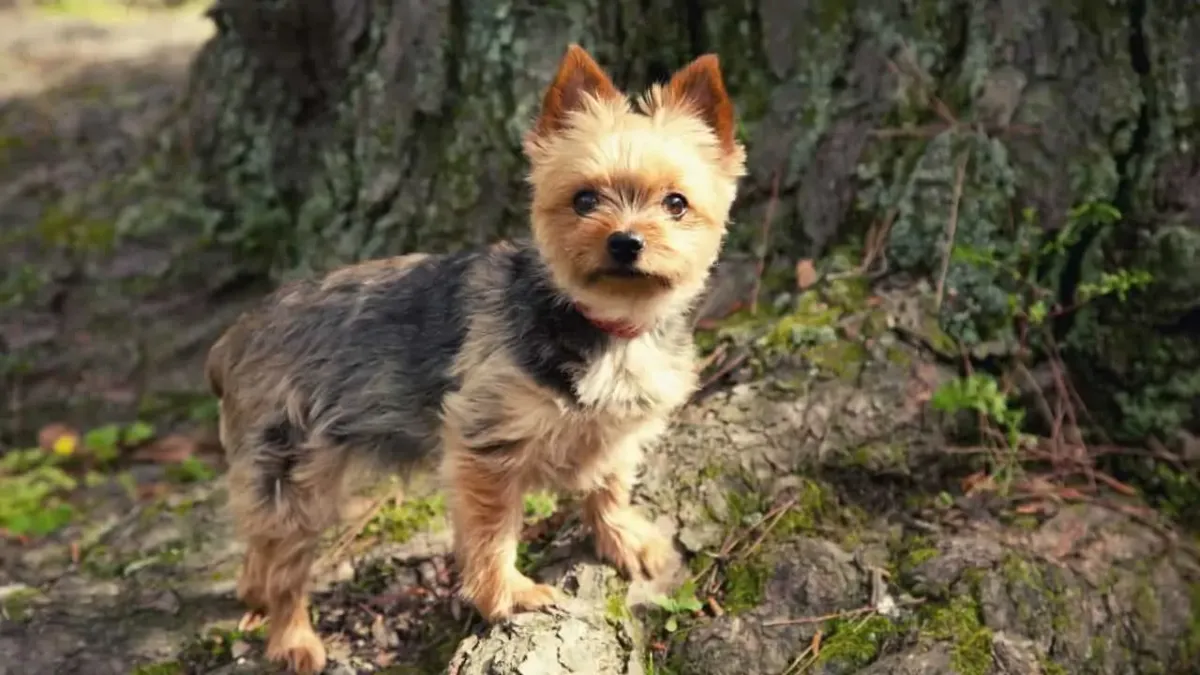
Summary
Reading through my article, it may be clear to you why Yorkshire Terriers are so popular. Despite their small size, they have a huge personality and courage and are so cute that you can’t dislike them. I hope, based on my article, you were able to decide if this breed is right for you. The point is, if you want a new dog, go to an experienced breeder or a shelter.
Frequently Asked Questions About Yorkshire Terriers
Is a Yorkie a good family dog?
Yorkies aren’t just smart and cute. They are kind, devoted, loving. They love their owners and their families very much. Because of this, they are excellent family dogs.
Are Yorkies cuddly?
Yes, they are very cuddly! Yorkies are social creatures and take every opportunity to be with their owners. If you have a dog like this, be prepared that it will cling to you very much.
Can a Yorkie be left alone?
If it is a short period of time, then, of course, there is nothing wrong with that. Yorkies, on the other hand, require a lot of love and attention. So they don’t like to be left alone. There is also the possibility of developing depression, anxiety, nervousness, and separation anxiety.
Do Yorkie dogs bark a lot?
In short, yes. Yorkies tend to bark a lot. Although they are small dogs, their behavior is territorial. This means they want to protect their home from intruders at all costs. Therefore, in many cases, they start barking at every little noise.
Are Yorkies hard to train?
Most things aren’t hard to teach to Yorkshire Terriers. However, they are notoriously difficult to potty train. This is because of their small bladders, which make them have to urinate often.
Do Yorkies like baths?
Yes, they usually tolerate bathing; sometimes, they even love it. However, be careful not to bathe your Yorkie too often. Frequent bathing can dry out the skin of dogs.

